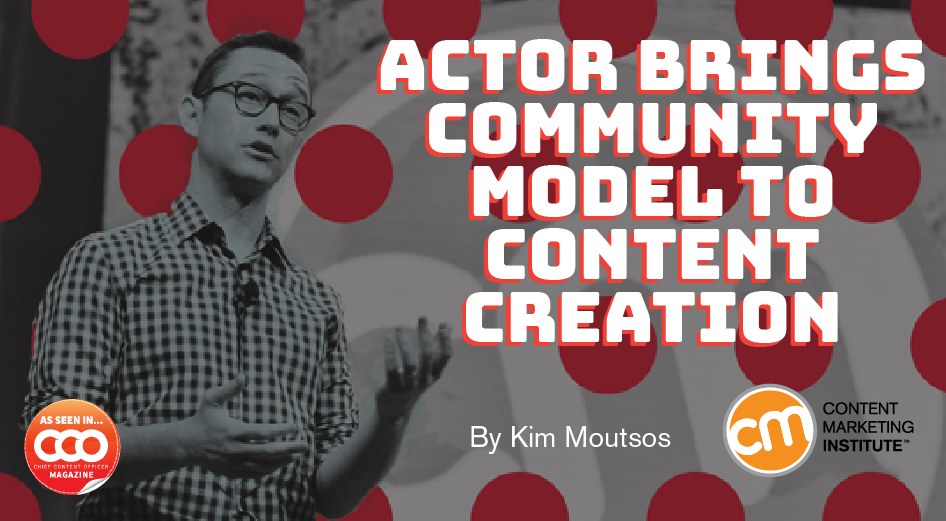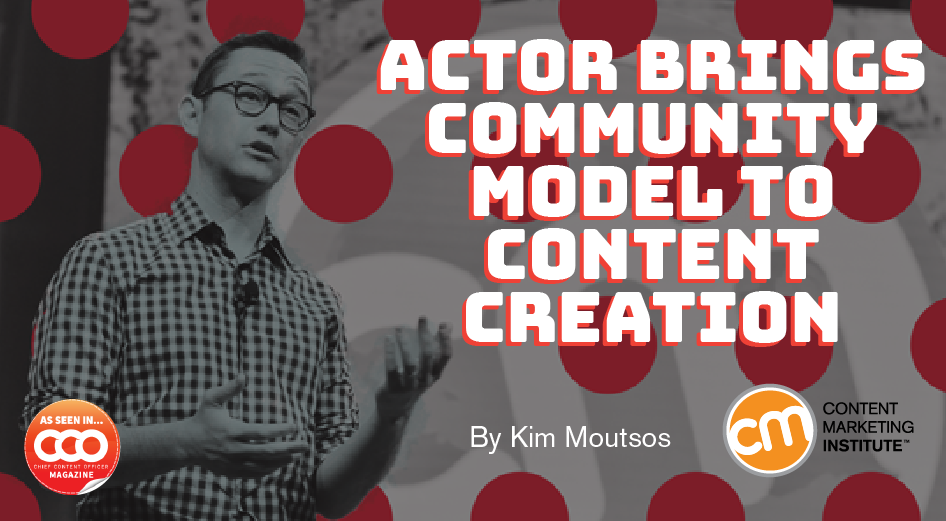Actor, director, writer, and producer Joseph Gordon-Levitt is anything but a regular Joe. At Content Marketing World 2017, Gordon-Levitt talked about how just such a career dry spell led him to seize control of his creative destiny and to build something few startups and brands ever achieve: a thriving online community that not only pays for itself but also shares the wealth with its contributors. Gordon-Levitt: I’ve been an actor since I was 6 years old. HITRECORD evolved organically as the (online) community grew over the last 10 years. CCO: HITRECORD feels like a community for creative brainstorming and ideation. It’s great that artists are putting their stuff out there for free if that’s what they want. CCO: What’s the role of non-media brands that produce content on HITRECORD? Gordon-Levitt: We make money from two categories: branded content and licensed content. Most creativity online is an individual posting something of their own: “Hey, world, look what I did.” On HITRECORD, we’re more about what we can do together when we collaborate. When we issue creative challenges, it’s about people working together to fulfill the challenge in the best way possible.

Don’t be fooled by his moniker on HITRECORD, the collaborative production company he founded with his brother in 2004. Actor, director, writer, and producer Joseph Gordon-Levitt is anything but a regular Joe.
His acting career already spans three decades and includes a long list of popular and acclaimed TV shows and movies: 3rd Rock from the Sun, The Dark Knight Rises, Lincoln, Looper, Inception, Snowden, 500 Days of Summer …
Having graduated from child actor to blockbuster star, it’s hard to imagine that Gordon-Levitt ever struggled to find work. Yet an actor’s life is never certain, and dry spells are not uncommon.
At Content Marketing World 2017, Gordon-Levitt talked about how just such a career dry spell led him to seize control of his creative destiny and to build something few startups and brands ever achieve: a thriving online community that not only pays for itself but also shares the wealth with its contributors.
CCO: How did the idea for HITRECORD come about? Were there moments in your life that formed the seeds for this project?
Gordon-Levitt: I’ve been an actor since I was 6 years old. At 19, I quit to go to college. When I wanted back in, I couldn’t get any acting roles. That was painful.
When you’re an actor, you depend on someone else to give you a role. That couldn’t be how it went in my life. I had to be creative and express myself on my own terms. HITRECORD became a symbol for me taking responsibility for my own creative outlet – for being the one to push that record button on the video camera. It’s also a pun. In the past, media was an object you would consume, like a hit record. Now media is more and more something you do, an action you take, something that you’re a part of.
HITRECORD evolved organically as the (online) community grew over the last 10 years. I think that’s a huge strength. You can feel the homegrown origins in the nature of HITRECORD when you go there. It’s not just a startup that was conceived as a business model. I think people feel that. It’s a big part of why creative people – who are notoriously difficult – really do trust HITRECORD. They come. They contribute. They participate. It’s not just a scheme to make money or to collect your data.
CCO: HITRECORD feels like a community for creative brainstorming and ideation. But the platform also generates finished/monetized projects. Do those projects produce enough revenue to support the community or will there be other ways to monetize?
Gordon-Levitt: For a while, it was purely a hobby I worked on with my brother. We didn’t spend money or make money. And then, starting in 2010, we launched as a production company with our co-founders.
We wanted to do ambitious things: create things good enough to become feature films, make records, write books. A TV show was our pie-in-the-sky goal.
To accomplish those…

COMMENTS